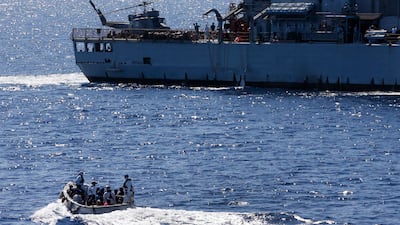Germany sent a warship to the Aegean Sea on Wednesday to watch for migrants and smugglers in the waters between Greece and Turkey.
The supply ship Frankfurt am Main is being sent as part of a Nato reconnaissance force to one of Europe's most perilous migration routes.
Turkish and Greek officers are expected to board the vessel to collect intelligence in a region where there is tension between the two Nato countries.
Findings will also be passed to EU border agency Frontex, which has been accused of covering up the forcible pushback of migrants in the Mediterranean.
The 20,000-tonne Nato vessel has a broader reach than Frontex's small patrol vessels, but has no powers to stop or detain migrant boats.
An estimated 7,300 people have arrived in Greece by sea this year, many of them landing on islands such as Kos, Samos and Lesbos. The majority have been of Palestinian, Afghan, Somalian, Eritrean or Congolese origin.
"Our task is to collect information and form an overview of migration movements and smuggling activities," said the ship's commanding officer Hanno Weisensee before it set off for a four-month deployment. It is under the authority of a Nato maritime group overseen from the UK's Northwood headquarters.
Germany has called for EU states to open legal migration routes in order to reduce pressure on Europe's borders. Last month Berlin reluctantly backed a compromise that will hand some asylum seekers an instant rejection in exchange for a solidarity mechanism to spread the burden of taking people in.

Berlin has come under pressure to address concerns over migration with the far-right Alternative for Germany (AfD) party riding high in the polls.
A leading spokesman for the centre-right Christian Democratic Union opposition party, Thorsten Frei, caused an outcry on Tuesday when he suggested the EU should abolish the individual right to asylum.
He proposed instead that the EU set a quota of 300,000 to 400,000 people per year and have them apply from their home countries, bringing an end to unsolicited applications on European soil. His suggestion was condemned as pandering to the far right.
The centre-right's so-called firewall against the extreme fringe "is in flames if it takes up the positions of the right-wing populists", said Chancellor Olaf Scholz's integration commissioner Reem Alabali-Radovan.
"People who are fleeing gunfire and rape do not have time for language courses and visits to the authorities in their home country. They are fleeing for their lives in the truest sense of the word."


